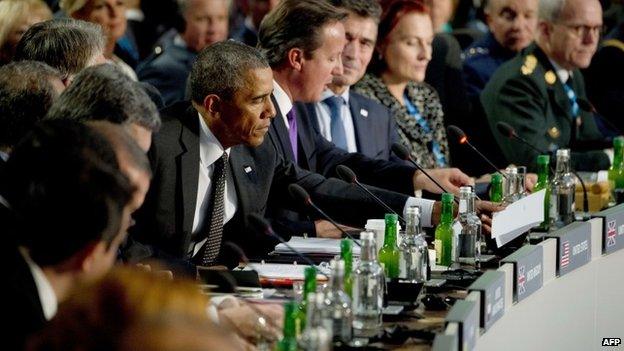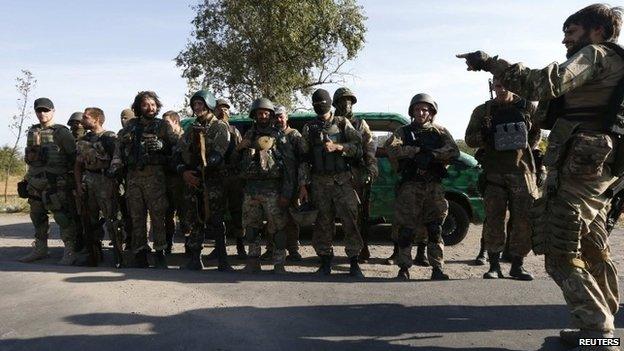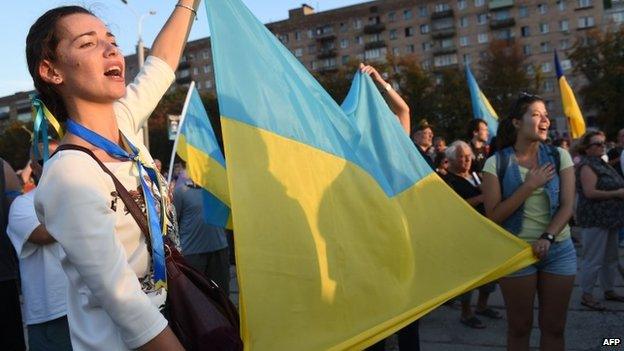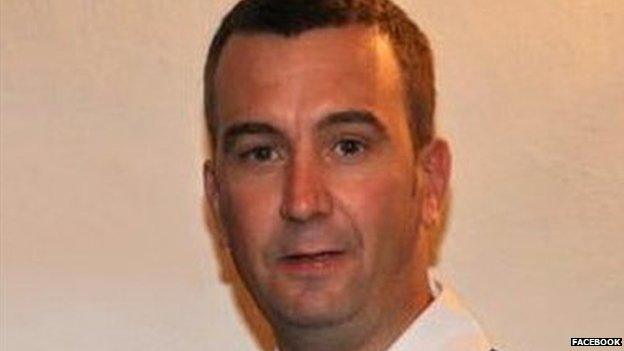Ukraine crisis: EU and US prepare tighter Russia sanctions
- Published
Ukraine's President Poroshenko: "Stability and security brutally undermined by Russian aggression"
Western countries are preparing to tighten sanctions on Russia over its action in Ukraine, US and British officials say.
Targets would include Russia's defence industry, state-owned banks and associates of President Vladimir Putin.
Peace talks including Ukraine, Russia and pro-Russia rebels are due to start in Belarus on Friday.
The West accuses Russia of sending arms and troops to back the rebels in eastern Ukraine. Moscow denies this.
A UK government official said the European Union would announce - jointly with the US - sanctions on Friday, including more restrictions on Russian banking, energy and defence.
More of what the official dubbed "Putin cronies" would have travel bans imposed on them.
"We will keep the pressure on Putin to force him to the negotiating table and off the battlefield," the official said.
Deputy White House National Security Adviser Ben Rhodes, speaking at the Nato summit in Wales, said the US was finalising new penalties.
French President Francois Hollande said European leaders would announce sanctions on Friday "and put them into action if there is no progress [on Ukraine], but everything will depend on the coming hours".
'Carefully optimistic'
Ukrainian President Petro Poroshenko and rebel leaders said a ceasefire could be agreed on Friday.
Nato Secretary-General Anders Fogh Rasmussen: "Putin wants protracted, frozen conflicts in the neighbourhood"
Watch: Timeline summary of the Ukraine conflict
Mr Poroshenko, who was also at the Nato summit, said the implementation of a peace plan could start on Friday, a hope expressed earlier by Mr Putin.
The Ukrainian leader said this depended on Friday's talks in Minsk between representatives of Ukraine, Russia, the pro-Russian rebels and the Organization for Security and Co-operation in Europe.
Mr Poroshenko said he was "carefully optimistic" about the outcome of the talks.
Rebel leaders were quoted as saying they would order a ceasefire at 11:00 GMT on Friday if the peace plan was agreed.
On Wednesday, Mr Putin announced a seven-point plan, including a halt to "active offensive operations" by the Ukrainian military and pro-Russia rebels, international ceasefire monitoring, unconditional prisoner exchanges and humanitarian aid corridors.

The summit has also called for Russia to end the annexation of Crimea

Ukrainian government forces are manning checkpoints in Mariupol - as rebel shelling was heard in surrounding areas
At the Wales summit, Nato said it "stands with Ukraine" in the face of Russia's "destabilising" influence.
Nato also called on Russia "to pull back its troops" from Ukraine and end the "illegal" annexation of Crimea.
Nato Secretary-General Anders Fogh Rasmussen said no-one wanted conflict with Russia and the best way forward was a political solution.
Some 2,600 people have died in fighting between Ukrainian troops and rebels. Ukraine's military says 837 its soldiers have died since the conflict erupted in April.
Mariupol threatened
Ukrainian government forces have recently suffered several losses of territory, after rebels launched offensives in both the Luhansk and Donetsk regions, and further south around the city of Mariupol on the Azov Sea.
Reports are emerging that the separatists have begun shelling the outer defences of Mariupol. Eyewitnesses spoke of gunfire.

At the scene: Fergal Keane, Mariupol

Mariupol residents hope for peace but brace for war
Tonight we can hear explosions close to Mariupol. These come after a day in which rebel forces pushed towards the city from the recently taken town of Novoazovsk.
At a Ukrainian government position on the edge of Mariupol, troops told us they had pulled back after coming under fire from what they claimed were Russian tanks.
However, when the local governor Serhiy Taruta arrived on the scene, he insisted there had been no retreat. "It is just our soldiers relieving other soldiers on a rotation," he said.
The situation is confused and the atmosphere volatile. At one point a vehicle arrived with a wounded man. The soldiers - from the volunteer "Azov" battalion - screamed at journalists to put down their cameras.
Later, several hundred people gathered in Mariupol to demonstrate for peace. They will be hoping the talk of a ceasefire plan becomes a lasting achievement in the next few days. In the meantime, however, the city is bracing itself for war.


'Unacceptable' actions
During the two-days of talks, Nato leaders are also discussing the rise of Islamic State (IS), and Afghanistan where Taliban militants launched a deadly attack on a government compound on Thursday.
An IS video released on Tuesday showed the killing of US journalist Steven Sotloff, just days after the group beheaded another American reporter, James Foley.

David Haines was captured in March last year with an Italian aid worker and two Syrians
In the latest video, an IS militant is also seen threatening to kill a UK hostage, aid worker David Haines, who was seized in March 2013 in Syria's Idlib province.